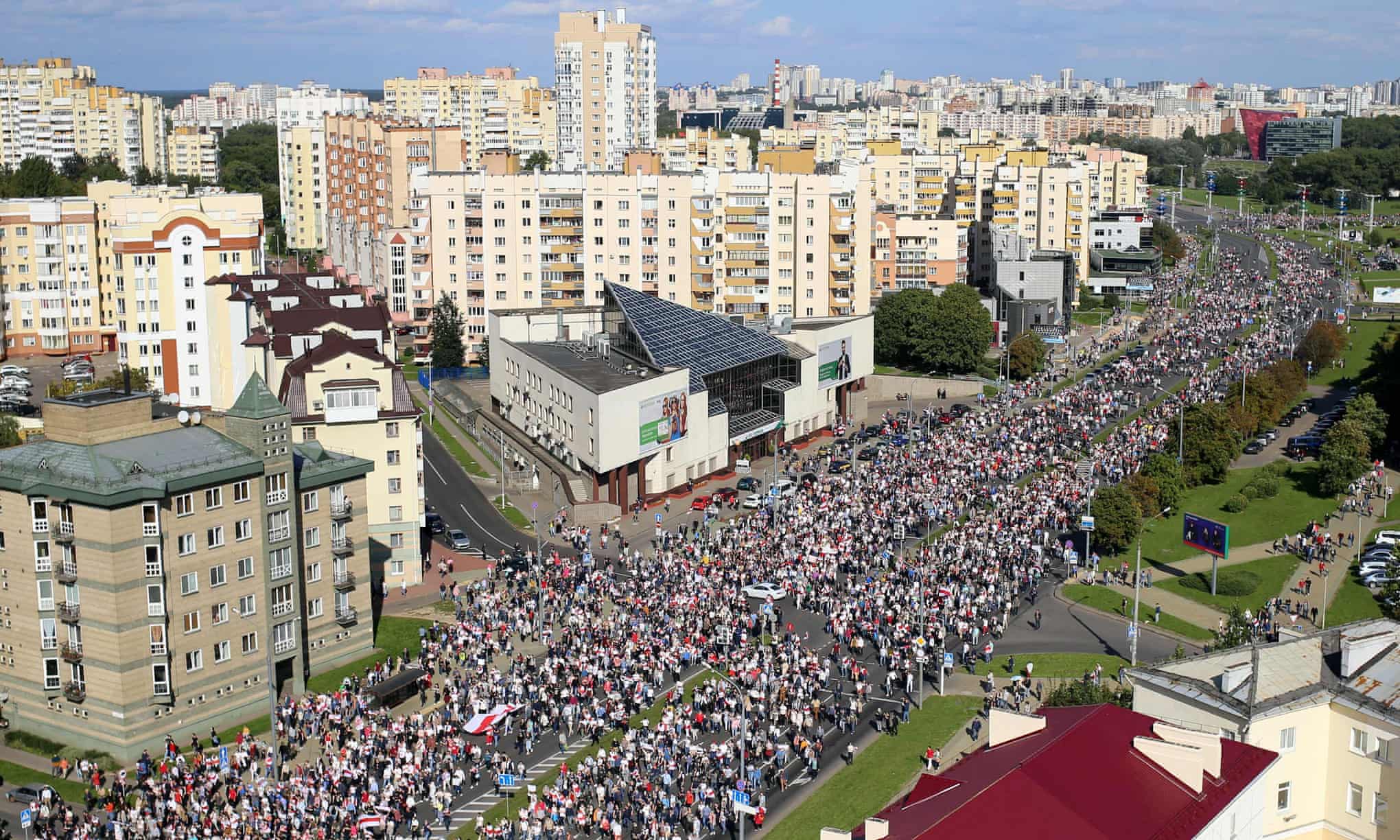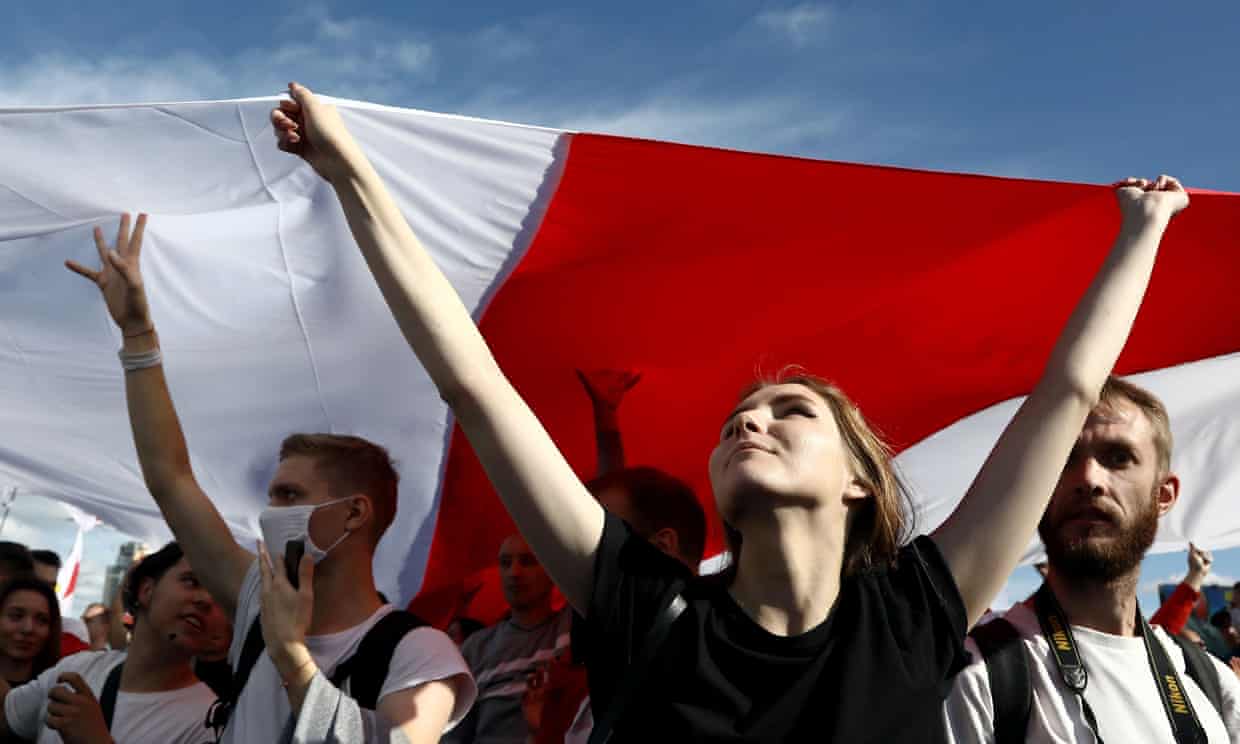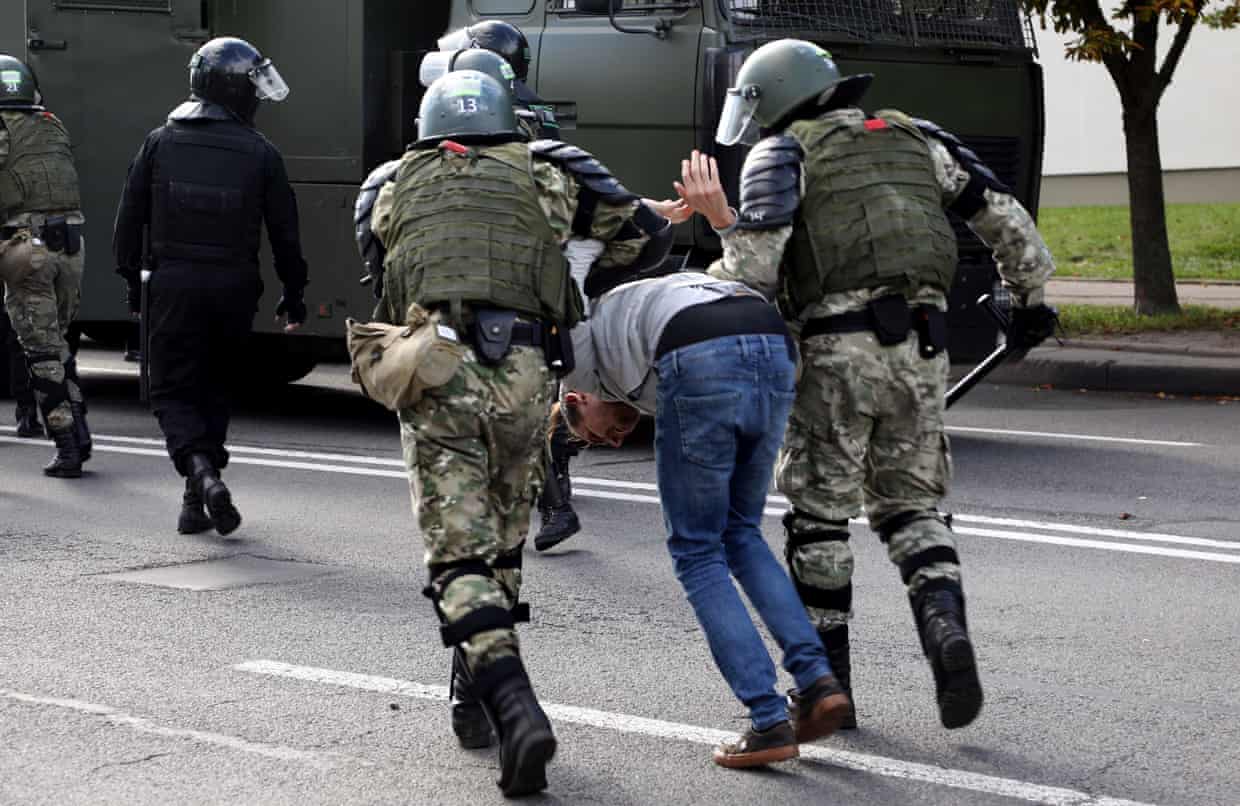
Belarus
Belarus: 100,000 join rally against Lukashenko on eve of Putin showdown
Protesters hold placards criticising Russian support as they march on president’s Minsk residence
by Luke HardingAttempts by Belarus’s president, Alexander Lukashenko, to crush popular protests against him failed on Sunday when more than 100,000 people marched on his residence in the capital, Minsk, with other demonstrations across the country.
There was no sign that the anti-Lukashenko movement is declining or fading away. Instead protesters took to the streets in huge numbers for the fifth weekend in a row, defying riot police who blocked off the city centre with military vehicles.
The continuing scale of the protests are an embarrassment for Lukashenko, who will meet Vladimir Putin on Monday in the Russian resort of Sochi. It will be their first face-to-face encounter since Belarus’s presidential election on 9 August, widely seen as rigged.
Lukashenko’s claim that he had won a landslide victory triggered a popular uprising against his 26-year rule. In recent days his security forces have sought to regain the initiative by kidnapping and exiling members of the main opposition body, the Coordination Council.
But the strategy has failed to quell the anti-government mood. Demonstrators on Sunday gathered in Minsk for the latest Sunday afternoon protest. They sought to wrongfoot the authorities by changing route and walking towards Drozhdy, where senior regime officials including Lukashenko have homes.

Riot police wearing balaclavas charged on groups of protesters, knocking them to the ground and dragging them away. At least 250 people were arrested and dumped in minivans. The detentions follow the arrest on Saturday of 114 people taking place in a peaceful women’s march in Minsk.
The demonstrators carried the white and red flags of the pre-Soviet Belarus republic, which have become a symbol of the protests. Slogans included “Resign”, “We are the power here” and “Shame”, shouted at a long line of masked police who barricaded their path at the Arena City shopping centre.
Similar protests and arrests took place in other Belarusian cities including Brest, Gomel, Grodna and Mogilev.
The opposition slogan for Sunday’s protest was: “We won’t let him sell the country.” There are fears that a weakened Lukashenko will allow a soft Kremlin takeover of Belarus in return for Russian support and security assistance that allows him to stay in power. Some in the crowd carried placards critical of Russia.
The meeting on Monday in Sochi is likely to be a delicate balancing act. Lukashenko wants Putin’s backing, but insists he is not willing to sign away the country’s sovereignty. Putin, meanwhile, has long found Lukashenko a frustrating and unreliable partner, but has decided to back him, at least for now.

But by propping up an unpopular ruler past his sell-by date Putin risks turning public sentiment against Russia. Opposition figures have made clear their quarrel is not with Moscow but with a president they believe is illegitimate and whose brutal tactics have alienated many.
“Belarusians are really aghast at Putin’s support for Lukashenko,” who has become “totally alien to his own people”, Valery Tsepkalo, an opposition politician, told Bloomberg, speaking by phone from exile in Poland.
There’s a risk that “Russia will turn the most friendly neighbour they have into a population that sees them as an accessory to Lukashenko and his authoritarianism,” said Nigel Gould-Davies, the UK’s former ambassador to Belarus.
The evidence suggests Lukashenko is determined to defy international pressure and to use any means necessary to wipe out the opposition.
Last week masked men in civilian clothes grabbed Maria Kolesnikova off the street in Minsk. Kolesnikova is one of three prominent female opposition figures who led the election campaign against Lukashenko. Police also seized Maxim Znak, another member of the Coordination Council’s seven-person presidium.
Kolesnikova was driven to the border with Ukraine but early on Tuesday ripped up her passport and refused to leave the country. She is now in an interior ministry pre-trial detention centre and has been charged with calling for a coup. Kolesnikova faces between two and five years in jail.
Svetlana Tikhanovskaya, who stood against Lukashenko and is now in exile in Lithuania, paid tribute on Sunday to those inside the country who are resisting Lukashenko’s rule. “Over the past month we have become a truly heroic people. We are continuing our fight for freedom,” she told supporters in a video address.
On Friday, the US said it would impose new sanctions on Belarusian figures within days and warned Moscow that continuing to back Lukashenko would only alienate its people. US deputy secretary of state, Stephen Biegun, asked how Moscow could “back such a regime and such violence against peaceful citizens”
“If the Kremlin continues down this path, it risks turning the Belarusian people, who have no grievance with Russia, against Moscow,” he said.
The European Union said on Saturday that it deplored “the increasingly open disregard for the rule of law in Belarus” and reiterated its determination to impose sanctions. It said it was “ready to take further restrictive measures as necessary”.